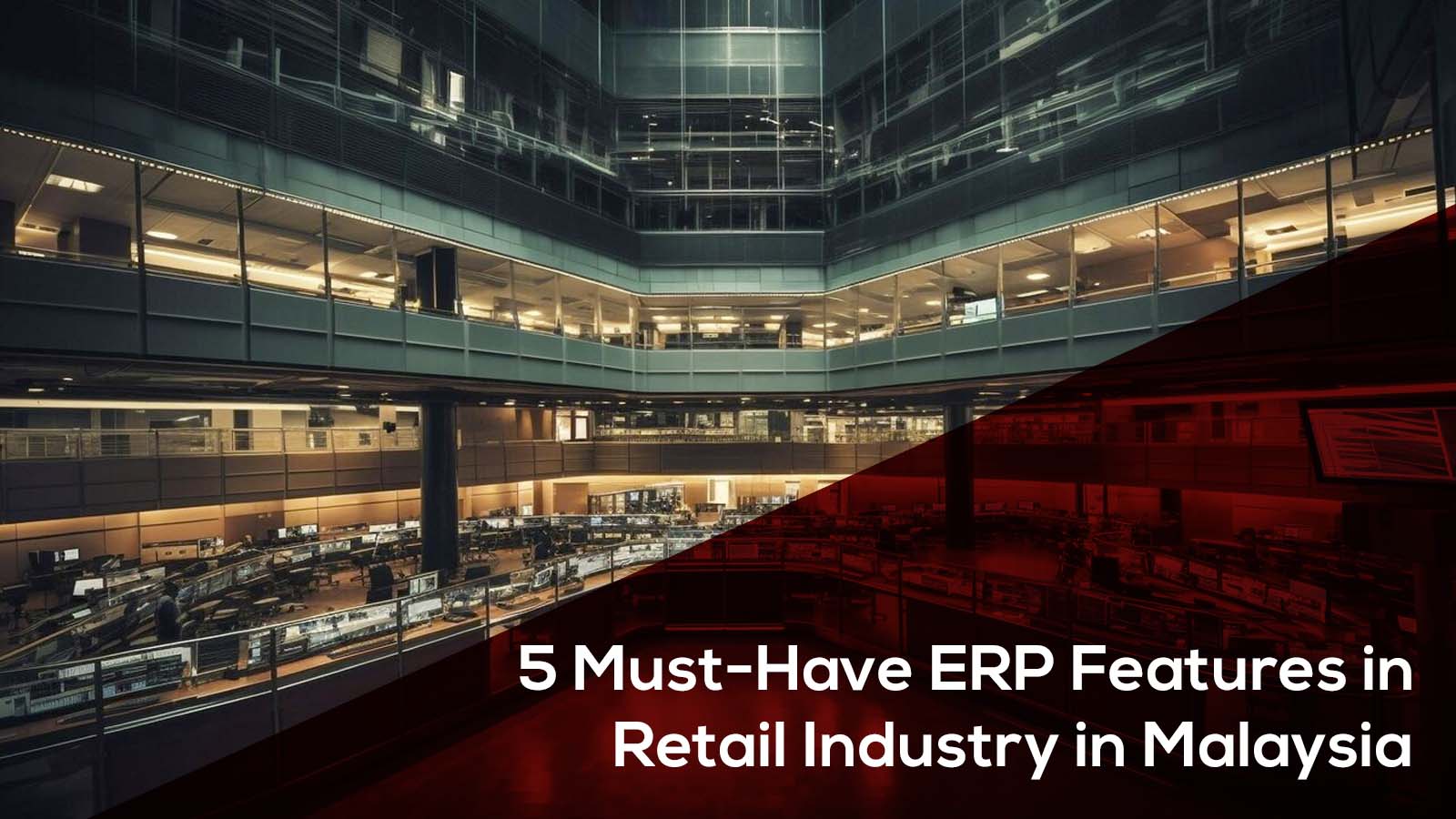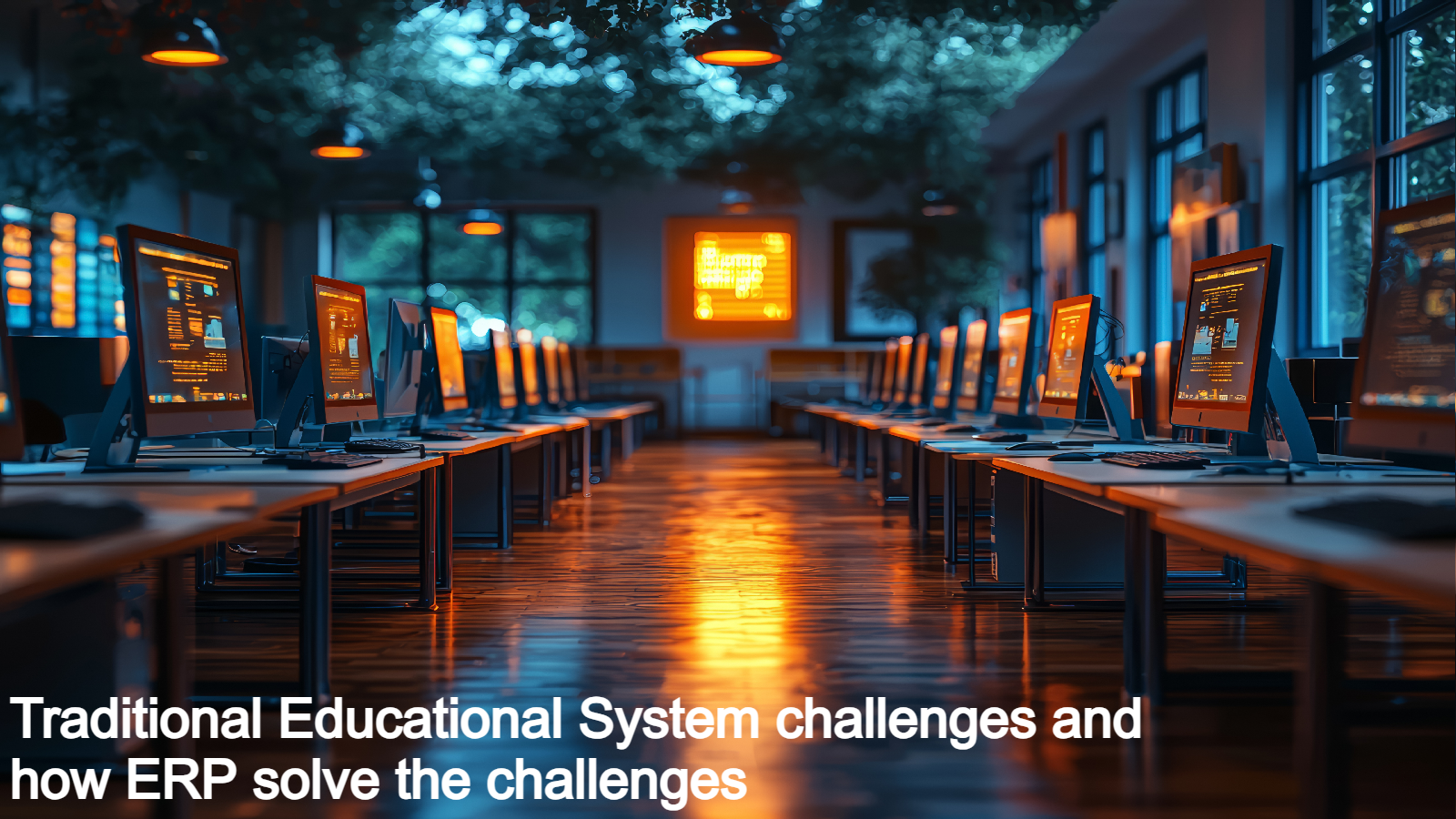Must Have Retail ERP Software Features
Introduction
In the ever-evolving landscape of the retail industry, staying competitive requires businesses to utilize advanced technologies that streamline operations, enhance customer experiences, and drive profits. One such tool gaining significance is Enterprise Resource Planning (ERP).
In this blog, we’ll look into the importance of ERP software and the five must-have features in the Malaysian retail sector.
ERP Features in the Retail Industry: A Brief Overview
Enterprise Resource Planning (ERP) systems are comprehensive software solutions designed to integrate and manage core business processes. In the retail sector, ERP optimizes operations, fosters growth and enhances customer satisfaction. With Malaysia’s dynamic and rapidly growing retail sector, ERP software systems are used to gain a competitive edge.
Importance of ERP Software in Malaysia’s Retail Sector
Malaysia’s retail market is extremely diverse with different customer preferences. In this dynamic environment, the importance of ERP software cannot be overstated. According to a recent study, 78% of retail businesses in Malaysia have either implemented or are considering implementing ERP solutions to improve their operational efficiency and strategic decision-making processes.
Efficient Inventory Management
Real-time tracking is important for efficient inventory management. ERP software systems provide retailers with the capability to monitor stock levels in real-time, minimizing the risk of stockouts or overstock situations. This real-time visibility is critical for faster decision-making and responsiveness to market variations.
Moreover, ERP systems come equipped with advanced demand forecasting tools, leveraging past data and predictive analytics to anticipate customer demands accurately. This ensures that retailers can optimize their inventory levels, reduce carrying costs, and enhance overall supply chain efficiency.
Integration Capabilities
Seamless integration with existing systems is vital in robust ERP software solutions. In Malaysia’s retail sector, where businesses often have diverse technology stacks, an ERP system acts as the force that ties together different systems. By connecting various departments, ERP software ensures smooth information flow, breaking down silos and fostering collaboration.
Customer Relationship Management (CRM)
In the age of personalized experiences, CRM functionalities within ERP systems are indispensable. Retailers can leverage ERP to create personalized customer interactions based on data insights, enhancing customer satisfaction and loyalty. Furthermore, ERP systems enable effective management of loyalty programs, providing retailers with tools to design and carry out loyalty initiatives that resonate with their customer base.
eCommerce Integration
The seamless integration of online and offline channels is a critical factor in the success of modern retailers. ERP software systems in Malaysia bridge the gap between online and offline stores, ensuring a unified customer experience. This integration extends to streamlining online order processing, reducing fulfillment times, and enhancing overall operational efficiency.
Mobile Accessibility
The retail landscape is no longer confined to physical stores. Mobile phones are becoming commonplace which makes convenience and accessibility vital. ERP software systems in Malaysia’s retail sector offer mobile accessibility, empowering decision-makers to access critical business information from anywhere. Mobile analytics further aid in data-driven decision-making, providing insights with a single touch.
Some other important features:
Data Security
The retail industry deals with vast amounts of sensitive customer and business data. ERP software systems play a crucial role in ensuring the security of this data. Cybersecurity breaches can have severe consequences, including financial losses and damage to the brand’s reputation. ERP software solutions in Malaysia ensure compliance with regulations and safeguards sensitive information.
Scalability
Adapting to the growing needs of the business is a fundamental requirement for success. ERP software systems provide the necessary flexible infrastructure for expansion. As businesses in Malaysia scale, their ERP systems can seamlessly grow to accommodate increased data, transactions, and users.
User-Friendly Interface
The usability of ERP systems is a critical factor in their effectiveness. A user-friendly interface simplifies the learning time for employees, allowing quicker adoption and maximizing the benefits of the system.
Cost-Effective Solutions
Through automation, streamlined processes, and optimized resource allocation, businesses can achieve significant cost savings. The investment in an efficient ERP system results in a substantial Return on Investment (ROI) over time.
Challenges and Solutions
While the benefits of ERP in the retail sector are countless, the implementation process is not without its problems. Common challenges include resistance to change, data migration complexities, and the need for extensive training. To overcome these challenges, businesses can employ strategies such as comprehensive change management plans, phased implementation approaches, and investing in robust training programs.
Future Trends in ERP for Retail in Malaysia
The next decade is expected to witness an increased emphasis on sustainability within ERP systems. Retailers in Malaysia will leverage ERP to optimize supply chain processes, reduce environmental impact, and meet the growing demand for eco-friendly products. Continued technological advancements, including the integration of artificial intelligence and machine learning, will also further enhance the capabilities of ERP systems. Additionally, the integration of immersive technologies like augmented reality within ERP systems may redefine the in-store shopping experience.
Conclusion
The adoption of ERP systems Features in the retail sector in Malaysia is not just a technological upgrade; it’s a necessity. From efficient inventory management and integration capabilities to customer relationship management and eCommerce integration, ERP systems provide a solution that empowers retailers to thrive in a competitive market. As Malaysia’s retail landscape evolves, ERP stands as a beacon, guiding businesses toward operational excellence, customer satisfaction, and sustained growth.
Frequently Asked Questions (ERP Features Retail Malaysia)
What is ERP, and why is it crucial for the retail industry in Malaysia?
Enterprise Resource Planning (ERP) is a software solution that integrates various business processes within an organization. In the Malaysian retail industry, ERP software plays a crucial role by streamlining operations, enhancing efficiency, providing real-time insights, and better decision-making, which leads to increased profitability.
Can you elaborate on the significance of ERP features specific to the retail sector in Malaysia?
Of course! The retail landscape in Malaysia is dynamic and highly competitive. ERP software features tailored for this industry address the unique challenges faced by retailers, such as inventory management, supply chain optimization, and customer relationship management.
How do these ERP features contribute to cost savings for retailers in Malaysia?
The integrated nature of ERP features results in streamlined processes and reduced manual effort. This leads to efficiency, minimized errors, and optimized resource allocation.
Is the implementation of ERP software time-consuming, and how can retailers ensure a smooth transition?
While ERP implementation requires careful planning, the benefits offered outweigh the initial time invested. To ensure a smooth transition, retailers should conduct a thorough analysis of their existing processes, engage stakeholders early in the process, and provide comprehensive training for employees. Collaborating with experienced ERP providers familiar with the Malaysian retail landscape can significantly quicken the implementation process.
Are these ERP features scalable for different sizes of retail businesses in Malaysia?
Yes, one of the strengths of modern ERP solutions is their scalability. Whether a retail business is a small boutique or a large chain, ERP features can be customized to suit the specific needs and scale of the business. This adaptability ensures that as the business grows, the ERP system can grow with it.
Can ERP help in compliance with regulatory requirements in the Malaysian retail sector?
Absolutely. ERP systems can be configured to incorporate and automate compliance processes. This is particularly important in the ever-evolving regulatory landscape of Malaysia. From tax regulations to data protection laws, ERP features can help retailers stay compliant, avoiding legal issues and potential financial penalties.
How do ERP features enhance collaboration among different departments in a retail organization?
ERP fosters cross-departmental collaboration by centralizing information and providing a shared platform for all business functions. For instance, the integration of inventory management with sales and finance ensures that everyone is working with the same real-time data. This promotes communication, reduces silos, and enhances overall organizational efficiency.








